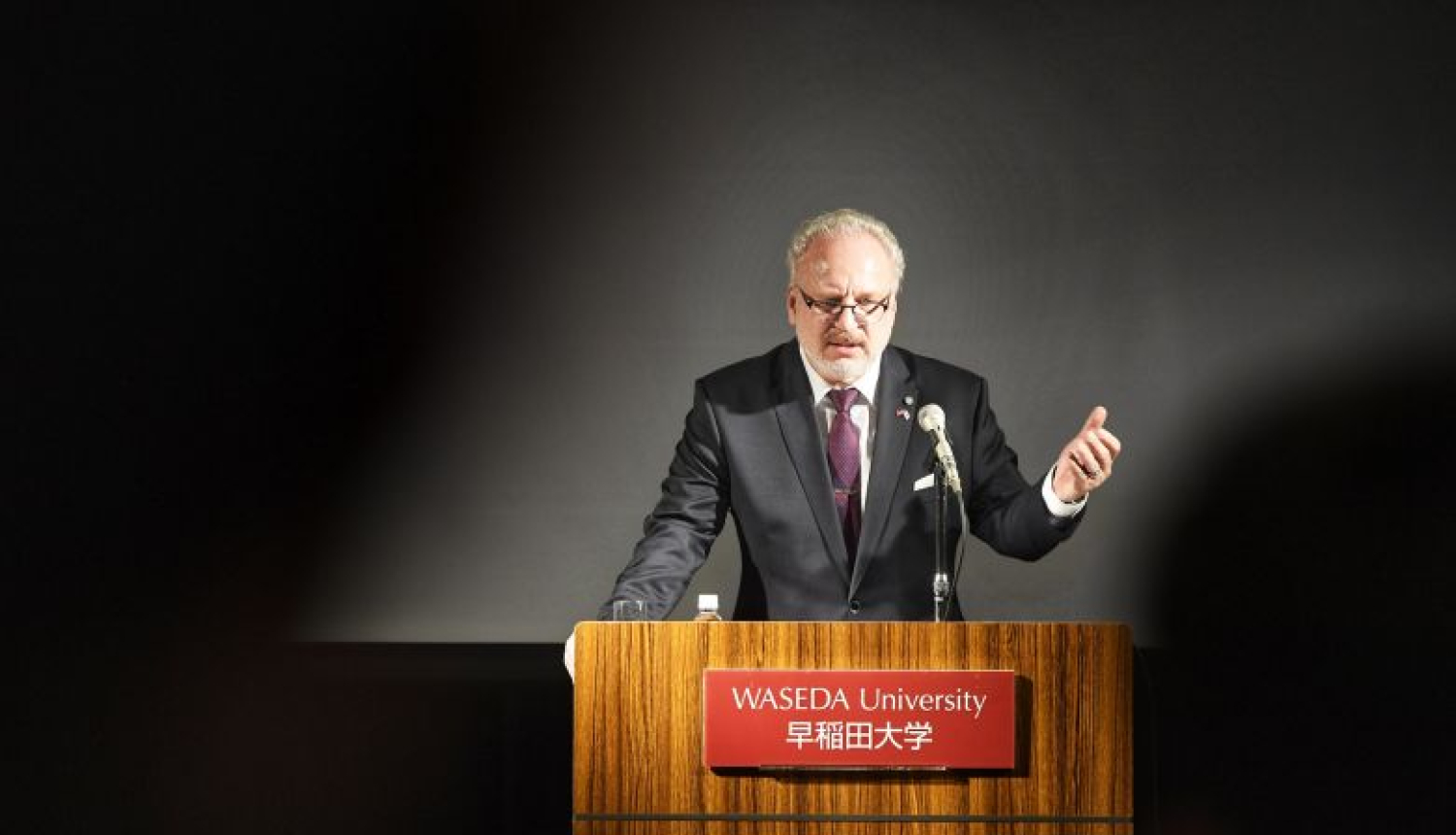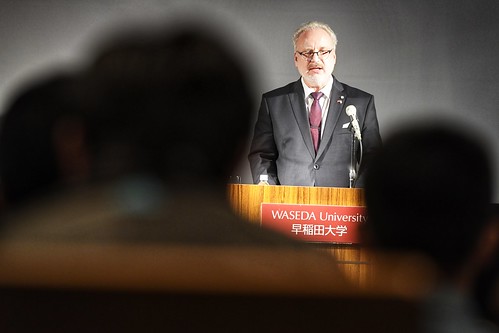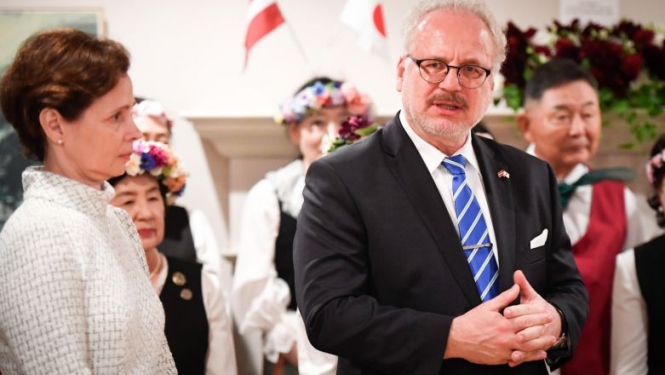Agenda of President Levits’ working visit to Japan also includes meeting with the Prime Minister of Japan, H.E. Mr Shinzo Abe, Chair of the Japan-Latvia parliamentary friendship group, H.E. Mr Hirofumi Nakasone and Latvia’s Honorary Consul in Osaka, Mr Tamio Ishibashi.
Full agenda of the visit of the President of Latvia to Japan.
Lecture of the President of Latvia, Egils Levits, at the Waseda University ‘Latvia’s perspective on challenges in modern democracies’
I
It is a great honour to be among you today at the Waseda University and share my perspective on current challenges in modern democracies. In my speech I will give a brief overview of Latvia’s and Europe’s perspective on the need to protect the democratic system and tools suitable for such protection.
I am happy and inspired about your interest and eagerness to discuss and spend your time contemplating democratic systems today. It means that we all are acutely aware of the importance of democracy and ready to make our input in promoting the sustainability of democratic systems.
People often tend to take democracy and its advantages for granted, as a permanent fixture we all benefit from. Therefore, societies often tend to shift their focus away from democracy because everyone believes that democracy cannot be threatened. However, the concern about democracy being under constant threat expressed by founder and chancellor of Federal Republic of Germany Konrad Adenauer is currently more relevant than ever.
II
Political history of the world, especially the 20th century, is not only about the victories of democracy and emergence of new democracies on the global map. 20th century has given us a really painful lesson of how quickly democracy can be lost.
I am a European, a Latvian. We in Europe know very well what it means to lose democracy. Crimes against humanity, genocide and holocaust. Complete denial of human dignity, freedom and value of life and brutal oppression of people by those in power. Systematic and all-consuming hatred of those in power towards benevolence which makes all of us human. Hatred towards everything associated with individualism and diversity that makes each one of us a unique person.
For most European countries these painful historic memories are still quite fresh. Fall of the Iron Curtain began only 30 years ago. Our generation witnessed the rebirth of the European unity, freedom and democracy.
Tremendous changes in Europe and around the world gave rise to euphoria and the sense that liberal democracy will always prevail. The sentiment of the time is fully reflected in professor Francis Fukuyama’s metaphor about the end of history as such. New democracies adopted modern constitutions that centred around human dignity and the rule of law as the form of government, and full respect for human rights and fundamental freedoms.
It seemed that the 21st century will be the best time for democracy, that there are no other equally good alternatives to democracy. There was hope that painful history has made our societies immune to various potential threats to democracy. Our societies should have been ready to not let anything like that ever happen again.
III
Nevertheless, 30 years later all initial euphoria and notions about the end of history are long gone. In retrospect, we can see how right Konrad Adenauer was when he warned us about the fragility of democracy. History has no end and democracy will always be threatened.
There will always be threats and risks to democracy. Our societies go through fundamental change with every new age and technologies often bring about inherent challenges that our democracies have to cope with.
The best way for us to protect our democracies against challenges of the new century is to rely on historic experiences and have no illusions. We must constantly be vigilant and ready to stand up for our democracies. We cannot afford to slip into self-complacency and think that these challenges do not apply to us and are a concern of other, much younger democracies that are yet to reach their maturity. As President of Israel’s Supreme Court Aharon Barak once said: ‘if democracy was destroyed in the Germany of Kant and Beethoven, it can happen anywhere’.
IV
Political and legal sciences describe modern democracies as constitutional democracies or democratic systems governed by rule of law. Modern democratic forms of government evolved over longer time and mostly coincided with the development of Western societies.
In Western political theory, modern democratic ideas stem from ancient Greek philosopher Aristotle’s understanding of politeia and Roman politician Mark Tullius Cicero’s concept of republic. These ancient thinkers who analysed the governments of Athens and Rome at the time already abundantly indicated the need to create a clear framework for the majority rule to ensure that such majority cannot discriminate and oppress minority or be prone to flawed decision-making.
Modern democracies have gone through constant improvements and upgrades which ensure that they can adequately respond to any democratic challenges and lock onto sustainable development of the society and the state. It is no coincidence that in history we have seen constitutional democracies reach higher levels of prosperity and growth than undemocratic states.
Development and growth has been based on human rights and fundamental freedoms, dignity and rule of law, respect for the minority rights and comprehensive safeguards of human individuality. Countries need extremely complex and intricate institutional systems to be able to protect these values and sustain them in the long run. Strong democracy and stable societies cannot grow without robust institutional framework.
Institutional frameworks of modern democracies can only operate if society trusts them. A regular citizen cannot know and usually is not aware of all the aspects of how these government institutions work. However, a citizen trusts these institutions, abides by their decisions and is safe in the knowledge that government bodies will act in the public interest, that they have required expertise and information to make appropriate decisions. Trust is the main asset of political and social capital which gives its legitimacy to modern democracies. Democratic institutions nonetheless need to pay back such trust by proving their reliability in terms of efficient and good governance and ability to fulfil the delegated functions. Societies expect their government bodies to cater to the needs of the whole society.
V
Modern democracies are built on particular values broadly accepted and protected by people. Stability and sustainability of modern democracies requires a level of political ethics that is acceptable for the majority of people. Weimar Republic is a vivid example of the failure of democracy without democrats.
Citizens play a vital role in governance of their countries and have clear responsibilities in modern democracies. Citizens have certain responsibilities and obligations, they no longer just people who are living, working and studying in their particular country.
Civic society is the cornerstone of democracy. It requires the understanding that you are not only an individual who takes care of one’s self and one’s relatives, but you also have shared responsibility for your nation, society and state. Nowadays, these individual responsibilities come along with supranational (regional, European) and global obligations. Citizens have to align their actions with core values of democratic societies to pursue the goal of common good and, thus, benefit the whole society and, more importantly, to make personal gains eventually.
In recent decades, Western world has experienced the decline of ‘civically-responsible’ model of behaviour and the rising prevalence of another, the ‘consumeristic’, model. Consumerism implies one’s inclination to always look for the ‘best deal’ for one’s self. Civic values are pushed to the side along with responsibility to take care of one’s nation, democracy and society as a whole. These things are no longer prioritised. Wide-spread consumerism may plague democracies and make them corrupt and easy to manipulate.
VI
Such changes in civic mindset give rise to populist politics. People often feel alienated from their states in modern democracies. Growing social inequality and excessive globalisation diminish confidence in future. Anti-democratic populist policies which play into general fear about future and feeling of disenfranchisement thrive under such conditions to gain political advantages.
Populist rhetoric may appeal to voters who are often confused. Political rhetoric of populists usually ‘hijacks’ the popular sentiments and speaks on behalf of all or majority of people, whereas political opponents are described as former elite that needs to be eradicated. Populists tend to offer over-simplified solutions to real problems. Usually such solutions are not rational. People overwhelmed by complexity of the world are quick to latch onto such over-simplified solutions.
Populist rhetoric often targets democratic institutions by criticising and stigmatising them. Institutions of modern democracies like constitutional courts, professional civil services and public broadcasting media are usually the main targets of populists trying to get hold of power. By weakening and appropriating these democratic institutions populists try to take over and capture the state in seemingly ‘democratic’ way. That is how modern democracies can be turned into undemocratic regimes that stay that way for a while.
Populists take hold of modern democracies through elections. They get the required majority of votes and other political groups and institutions are forced to recognise them. This again shows what an important role each citizen plays in democratic processes. The future of the whole democracy often depends on whether we make those responsible choice or not.
VII
Classic theories of democracy are based on an assumption that citizens are capable of critical thinking and make rational decisions. However, the development of information and communication technologies has made it a lot easier than ever to condition people’s world views and shape the general public attitudes. For example, you can filter information fed to people to create an impermeable ‘filter bubble’ that modifies people’s views in a manner suitable to those trying to control the minds of the people.
It is done through big data processing. Big data analytics allows you to collect data about the user and profile them. Machine learning gives you a precise ‘blueprint’ of one’s decision-making process – map of rational and emotional triggers of one’s response to specific information. World wide web has tracking, scoring and profiling functions for that.
Such protocols pose political threats when the system learns the exact response of a ‘client’ to a politically-charged issue, for example, vote in elections, when the ‘client’ is exposed to targeted or personalised information through channels like social media.
VIII
Consumerism, populism and manipulative use of technologies creates new challenges to modern democracies. In recent years we have seen democracies conceding to and confidently overcoming these challenges. We have learned to identify these new challenges and talk about them.
Today’s discussion on challenges to modern democracies in a university carries a deeply symbolic meaning. Universities have traditionally been then main platform of democracy, a place where scientific rationale, critical thinking, academic liberty and spirit reside. Scientific community has always been known for individual thought, credibility and ability to interpret the complexities of the world. All of these are the qualities that are becoming essential for every citizen’s democratic responsibility and loyalty.
We are not born democrats, we become democrats because our community ‘injects’ these ideas and values into our DNA. If we assume that democracy is the best form of government, we need to, literally, reinterpret it to every new generation. This applies to mature democracies, as well. It seems that none of democratic countries has succeeded in that.
I would, therefore, like to urge everyone today to think about bringing democracy closer to the people and educating citizens and providing them skills necessary for ensuring the longevity and sustainability of democracy.
IX
Let me conclude by specifically underlining that democracy is not a give from historical perspective. Democracy has been around for a short time and in a relatively small part of the world. Global democratic community must be aware of the vulnerability of democracy at all times and all regions.
Democracy is far from perfect, but it is the highest political achievement of the mankind. It is the only form of government that learns from its mistakes and constantly improves itself. Societies need to be aware that all other forms of government that have been created so far have underperformed.
And last but not least, democracy is not helpless. Modern constitutional democracies also have integrated ‘life-savers’. Modern democracies are ‘combat ready’. Self-defensive democracy can protect itself from destruction by means of guaranteed freedoms. Citizens and institutions are required to protect and defend democracy also against new challenges.
X
I have given you my perspective on challenges in modern democracies, but I have not given solutions to these challenges. You represent the academic community, so it is your task to discuss and find those solutions. I can only put forward some ideas on how to address these challenges.
I have already mentioned one such idea – the notion of self-defending democracy. Self-defending democracy is a political un judicial concept that developed after the World War II in Europe, especially Germany, but also in other countries, as a reaction to the democratic self-liquidation that we saw in 1933 in Germany. This judicial concept was introduced by several constitutional courts, also, and this is important, by Latvian Constitutional Court but, inter alia, also by German, Austrian and Italian Constitutional Courts.
What does self-defending democracy represent? Self-defending democracy prevents the use of democratic freedoms against democratic principles. If someone wants to interpret freedoms, for example, freedom of expression, freedom of association, other political freedoms in an undemocratic way, we have democratic safeguards, legitimacy and also democratic institutions that have the duty to prevent such attempts. And we cannot allow such attempts to undermine the basic principles of democracy. That is the core of the concept self-defending democracy.
This concept was further developed in the USA after 9/11 by constitutional lawyers and political scientists. I do not know whether this concept is also known in Japan, but I think in many parts of the world this notion is integrated in the concept and the political structure of democracy. Of course, this concept developed in the last decades of the 20th century and current challenges we face have slightly changed. I mentioned already the big data and profiling of individuals. We should, it is my personal opinion and we can discuss that, expand the concept of self-defending democracy further to be able to address the new threats amplified by new technologies that influence public opinion and your opinion, as well. We always try to influence others. It is normal. Communication is aimed at influencing others, but it is necessary to distinguish between due influence, legal influence, appropriate influence and undue influence which is usually covert and the other side might not be aware of your attempts to influence their opinion.
I think this is the dividing line between the due influence, appropriate influence and undue influence which undermines the democracy and strengthening of democratic world views in the society. But what is its source? How to deal with that? No doubt, society, social media and participation of people in political decision-making process is very import, and it has been increasing in the recent years. More and more people want to participate in political decision-making process – ‘inclusive democracy’ is the word for that. At the same time inclusive democracy does not mean that the quality of decisions is improving. There is a kind of contradiction between the inclusion and the quality, but I assume also that undue influence of public opinion should be challenged by legal and other means. It is rather problematic to do it by legal means because laws are national and World Wide Web is international, and it is not possible to control it by national means.
Nevertheless, there are some starting points. We can consider such legal means and I am speaking only about legal means. How is big data generated? The source of big data is the constant monitoring of persons. If your phone is used to constantly monitor you and other means like location services are used to find out where you are and what you are doing, profiling can be used to identify the patterns of your behaviour. And this is where it starts – with monitoring.
Monitoring of individuals using their phones, for example, what is the reason for that? It is used by companies whose business model is based on monitoring you. I think it is the task of politicians to start the debate on whether we want to be monitored 24 hours a day, constantly and very closely.
This is a starting point also for a debate on political and judicial response to that. In Europe we have adopted a new data protection regulation (GDPR). It contains some elements that I mentioned already but, of course, it is not perfect and, I would say, some of its elements are already outdated. But I think it is a good starting point, a good example of how to approach this problem. But it is necessary to improve those regulations and also think about our national regulations in different countries.
I do not know what data protection frameworks Japan has, but I think each modern democracy should apply the concept of self-defending democracy to address these new challenges. And, unless we do something about it, our democracies will turn into an empty shell because public opinion and elections will become useless. If everyone knows that elections can be rigged, there is no point to hold elections.
So, this is only one of the concerns that we need to address and we can have a more detailed discussion on these issues now. I would very much welcome your proposals on the issue. Thank you very much!








